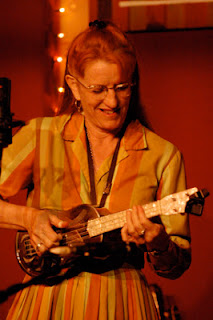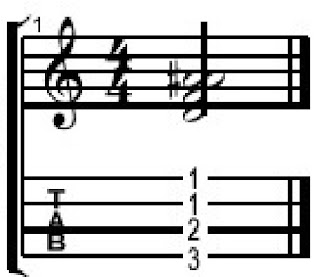Intervista ukulelistica a Del Rey
1. Can you tell us
something about your musical background? / Come descriveresti il tuo background musicale?
My mom came home with a guitar for herself when I was around four
years old. When my parents saw I was interested, they went back nd got a little
three-quarter-size guitar for me. My mom tried to stay a week ahead of me in
the book! She stopped fter a while, but I kept on playing.
Mia madre tornò
a casa con una chitarra per se stessa quando avevo circa quattro anni. Quando i
miei genitori e quando hanno visto che ero interessata, sono tornati a
prenderne una taglia tre quarti per me. Mia madre ha cercato per una settimana di
farmi stare davanti al libro per studiarla! Si fermò dopo un pò, ma io ho
continuato a suonare.
2. What’s your
favourite music? Do you listen to everything or do you prefer only some kind of
music? / Qual
è il tuo approccio globale alla musica in generale?
I like music from about 1900-1960 primarily, especially the 1920s,
especially jazz, blues and ragtime. I do listen to modern music that sounds
made by a person (rather than made according to a commercial
"formula"). I like punk music, music by artists like Laurie Anderson,
modern opera like "Nixon In China".
Mi piace la musica dal 1900 al 1960 circa in primo luogo, in particolare quella degli
anni ’20, in particolare jazz, blues e ragtime.
Ascolto la musica moderna suonata
da una persona (piuttosto che secondo una commerciale "formula").
Mi piace la musica punk, la musica di artisti come Laurie Anderson, l'opera moderna come "Nixon in Cina".
3. How long did you play ukulele? / Da quanti anni suoni l’ukulele?
About 15 years.
Circa 15 anni.
4. When did you start playing ukulele and
why? / Come
hai conosciuto l’ukulele? Chi o cosa ti ha spinto ad iniziare a suonarlo?
My good friend Sandy Hines encouraged me to try the uke,
surrounding me with ukulele-strumming women chanting "Four strings GOOD,
six strings BAD!" for hours…
Il mio buon amico Sandy Hines mi ha incoraggiato a provare l’uke, mi ripeteva con ukulele-strumming
che le donne cantano "quattro corde son BUONE, sei
BRUTTE!" per ore ...
5. When did you buy your first ukulele? / Quando
hai comprato il
tuo primo
ukulele?
Very first one was from the flea market. It was a $20 pineapple. I
carried it around in my handbag with no case until the neck fell off. Then my
guitar maker, Ron Phillips, made some metal ukuleles for himself and his son to
play. They sounded wonderful, so I asked him to make me one too.Like the
guitar, I play ukulele by ear. Even more than with guitar.
Il primo vero l’ho comprato in un negozio dove vendevano i Flea. E
'stato un pineapple da 20 dollari. L'ho portato in giro nella
mia borsetta fino a che non mi è
caduto e rotto la tastiera. Poi il mio liutaio, Ron Phillips,
ha apportato alcune ukulele in metallo
per sé e suo figlio per suonare. Si suonava
magnificamente, così gli ho chiesto
di farmene uno. Mi piace la chitarra, l’ukulele lo
suono a orecchio. Ancor più che
con la chitarra.
6. What kind of music do you like to play
with your ukulele? Which size of ukulele do you prefer? / Che tipo di
musica ti piace suonare
con il tuo ukulele? Quali sono le
dimensioni di ukulele che preferisci?
Ragtime and blues from the '20s and '30s.
I mostly play a D-tuned concert-sized metal resonator uke made by
Ron Phillips(www.metalgitar.com).
I also record with an 8-string tenor-sized koa Kamaka from the 1970s. I also
have a concert ukulele made in Australia by Scott Wise, that's my favorite
wooden uke.
Ragtime e blues degli anni ’20 e 30.
Io per lo più suono un D-tuned
concerto risonator in metallo realizzato da Ron Phillips (www.metalgitar.com). Ho anche registrato con
un 8-string tenore in koa Kamaka dal 1970.
Ho anche un ukulele concerto realizzato in
Australia da Scott Wise, questo è il mio uke preferito in legno.
7. You surely played a lot of types of
ukulele. May you describe us the differences among them? / Tu che hai sicuramente
provato diversi
modelli di ukulele. Potresti descrivermi la differenza secondo te?
I like banjo ukes for a lot of old music, but it's somewhat hard to find one that really plays in tune. The music I like is fairly bold, and I play with horns and loud instruments a lot, so I like an instrument that makes a big sound without losing the sweetness of a uke. I don't plug in either-I HATE the sound of a pick-up on a uke.
Mi piace uke banjo per un sacco di musica antica, ma è un po’ difficile trovare uno con cui suonare veramente
in sintonia. La musica che mi piace è abbastanza audace, e io suono con
strumenti con le corna e molto forti, quindi mi
piace uno strumento che emette un suono
grande senza perdere la dolcezza di un uke. Non
li collego ad un pick-up perché ODIO il
suono di un pick-up su un uke.
8. Which ukulele size do you suggest to
beginners? / Quale taglia di ukulele consigli a chi deve iniziare?
Soprano or concert.
Soprano
o concert.
9. What’s your favourite ukulele brand? / Qual
è la tua marca
preferita ukulele?
For me, Ron Phillips for a metal uke and Scott Wise for a wood
one. Those are top dollar instruments. A good beginners uke, that plays in tune
and makes a big sound for a small price is the Kala.
Per me, Ron Phillips per un uke in metallo e
Scott Wise per
uno in legno. Quelli sono strumenti di costo superiore. Un buon uke per principianti, che suona accordato e fa un suono grande con un piccolo prezzo è il Kala.
10. Which parts of the ukulele are important
(strings, wood, bridge…) to increase the
quality ? How do we understand if our ukulele is a good ukulele? / Quali sono i parametri
(tipo di legno, corde, tastiera, ponte, ecc…) che l’ukulele deve avere per
essere considerato buono? A quali caratteristiche guardi tu maggiormente?
The most important thing to me is that the uke is in tune up the
neck and that the tuners work well. An experienced player can make a slightly
sour uke sound good, but for beginners having the uke itself be in tune is
really important, as they aren't experienced enough to make the tiny
adjustments that a seasoned player does almost automatically.
La cosa più importante per me è che
l'uke sia accordato per tutta la
tastiera e che le meccaniche
funzionano bene. Un suonatore esperto può emettere un buon suono anche
con un uke leggermente scordato, ma
per i principianti avere un ukulele accordato
bene è molto importante, in
quanto non sono abbastanza esperti per rendere le piccole modifiche che un suonatore esperto fa quasi automaticamente.
11. Ukulele became so popular in Italy and
all over the world recently: what do you think about this and what are the reasons of these growing? / Abbiamo assistito, in questi ultimi anni,
ad una diffusione crescente dell’ukulele in Italia e nel mondo: secondo te, a
che cosa si deve questo boom?
People are tired of just being consumers of music-they want to
make it themselves! The ukulele is easy and fun and sounds good pretty fast if
you practice-perfect.
La gente è stanca di essere solo degli ascoltatori di musica, la vogliono anche fare da soli! L'ukulele
è facile e divertente e si impara bene e piuttosto velocemente se si fa pratica.
12. Do you have any suggestions for ukulele
beginners? / Che consiglio ti senti di dare a chi vuole incominciare a suonare
l’ukulele, o comunque è alle prime armi?
Practice as much as you can and don't judge yourself. Try and
remember how you were when you were a little kid playing-you didn't compare the
sounds you made to anything-you just had fun making noise, and the noise
gradually will become music.
Pratica il più possibile e
non ti giudicare. Prova a ricordare come eri
quando eri ragazzino e suona senza confrontare i suoni
che hai fatto con niente, divertiti facendo rumore
e il rumore a poco a poco diventerà musica.
13. We’re at the end of this interview…
Thanks for your patience and kindness! Would you like to say something to our
ukulele fans? / Siamo arrivati alla fine dell’intervista, ti ringrazio per la
pazienza, la gentilezza e la disponibilità. Vuoi chiudere dicendo qualcosa agli
appassionati che leggeranno questa intervista?
Ukulele Daily!!
Ukulele quotidiano!!



Commenti
Posta un commento